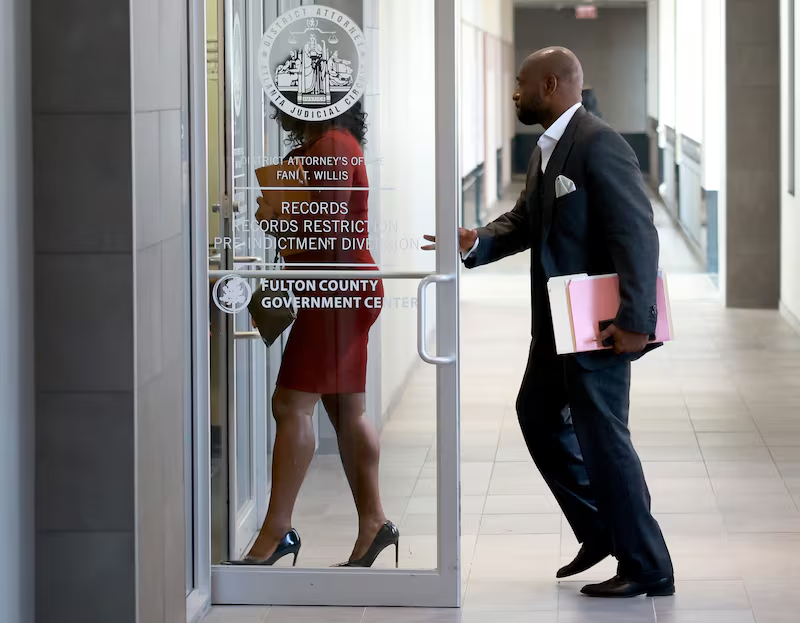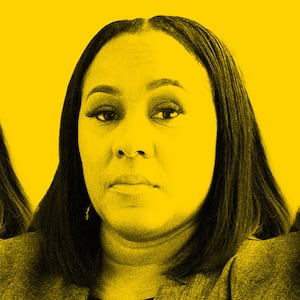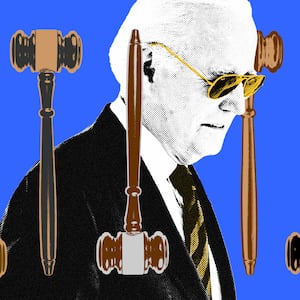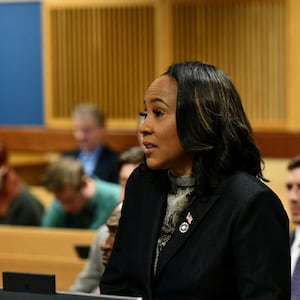In the past week, we’ve seen commentary from law professors and former federal prosecutors arguing that Fulton County (Georgia) District Attorney Fani Willis should not be disqualified—even though she hired as a special prosecutor Nathan Wade, a man she was allegedly dating, paid him nearly $700,000, and received vacations in return.
I disagree.
Before I get into why, a disclaimer. If these allegations are false, there is no basis to disqualify Nathan Wade or Fani Willis. There is no reason why hiring an inexperienced person for this role and paying him a lot of money should, by itself, have any impact on the Donald Trump RICO case Willis is prosecuting. We can expect a hearing on these allegations in February, and if Judge Scott F. McAfee finds them not to be credible, the case will continue as it was.
It seems like those facts may not be in dispute, however. After the allegations were made public, Willis gave a speech decrying the expectation that black women be perfect, and comparing herself to Martin Luther King Jr.—who was also tormented over his personal life by his political enemies. She claimed that Wade’s race, and not his limited criminal litigation experience, was the basis of public skepticism, and noted that people had not scrutinized the other two special prosecutors, who are white, about their credentials.
But there are good reasons for this. The other two special prosecutors are incredibly qualified. For instance, Anna Cross is a former DeKalb County assistant district attorney who handled dozens of felony appeals and argued important motions for Fulton County. John Floyd is widely considered Georgia’s leading expert on state RICO prosecutions and helped draft the law. Combined, they billed $116,000 (less than a quarter of Wade’s total). And according to an agreement obtained by the Daily Caller, Floyd appears to have been paid about $100 less per hour than Wade.
In her speech, Willis argued that Wade was competent because he had been hired as special counsel by a white Republican when Cobb County hired him to conduct an investigation into jail deaths. But a local news station successfully argued that the investigation was only launched to prevent the public from filing open records requests into the deaths. At the hearing, Nathan Wade admitted that, despite spending five months talking to deputies and investigating the issue, he had failed to keep a single note. Cobb County quickly settled and turned the papers over. This suggests that Wade might not have been selected because he was especially diligent, but rather because he could be trusted to help keep a secret.

Special prosecutor Nathan Wade arrives at the office of Fulton County District Attorney Fani Willis at the Fulton County Government building on August 23, 2023 in Atlanta, Georgia.
Joe Raedle/Getty ImagesThe man’s credentials are, regardless, a bit of a sideshow. They are relevant only to suggest that there was a personal relationship between Willis and Wade. It certainly doesn’t help that Wade filed papers to divorce his wife the day after Fani Willis hired him. But even if he were indisputably the best person possible for the role, he was paid $654,000, and Willis made choices throughout her prosecution that seem, in hindsight, calculated to require him.
Take the special grand jury, for instance. In 2022, Fulton County announced that it would use a special grand jury whose purpose would not be to indict anyone, but instead to gather evidence. These kinds of grand juries are very common in federal practice, but quite rare in Georgia.
And at the time this special grand jury was convened, it was already indisputable that Donald Trump had lied to Georgia Secretary of State Brad Raffensperger in the wake of the 2000 election, and sent Rudy Giuliani to lie to the state’s General Assembly, and encouraged fake electors to certify that they were real electors. In other words, the makings of a hard-to-challenge criminal conviction were already there. But instead, Wade was broadly used during those special grand jury proceedings, and he earned hundreds of thousands of dollars helping to conduct them. We now see the price of those delays, as Fulton County struggles to try the former president before the November election.
That gets us to the law. In 2022, Superior Court Judge Robert McBurney disqualified Fulton County from presiding over the prosecution of Lt. Governor Burt Jones because Fani Willis endorsed his political opponent, Democrat Charlie Bailey. In the order, the judge notes that there was an “actual” conflict of interest. This “does not mean that… Jones has definite proof that an investigative decision was made explicitly to benefit candidate Bailey. This rarely, if ever occurs… the conflict is actual because any public criminal investigation into [then-]Senator Jones plainly benefits Bailey’s campaign, of which the District Attorney is an open… supporter.”
The standard to disqualify Fulton County here is not whether Fani Willis actually made her decisions to benefit Nathan Wade. It’s plausible that she would have made the exact same choices without the personal relationship. But if her choices to extend or prolong the investigation benefit a romantic partner, who is paying for her meals and vacations, that is an actual conflict.
When a Georgia judge was found having sex with a public defender outside the courthouse, the courts did not hesitate to find that this undisclosed sexual contact required new trials for the accused, even if it might have arguably been to their benefit.
Just as here, the guilt or innocence of those accused was irrelevant. The conflict of interest required a new trial.
So what happens next? Judge McAfee has stated his intention to hold a hearing in February to look over the truth of these allegations. If they are true, the case will not be dismissed, but it is likely that he will disqualify Fani Willis, which, under Georgia law, will require disqualifying her entire office. The case will then go to the Prosecuting Attorneys’ Council of Georgia, which will decide who the case can go on to next.
In the best-case scenario, the case will find its way to someone like Sherry Boston in DeKalb County. She’s a long-time district attorney who is not prone to seeking the limelight. She’s in a blue part of the state. And her office has the budget, the bandwidth, and the experience to tackle this case, possibly by simplifying some of its rococo elements. The Prosecuting Attorneys’ Council also has competent attorneys who can bring the case on their own. But even if everything goes as smoothly as humanly possible, it is difficult to imagine trying the former president before the November election. And it’s also possible the case may go to someone who will choose to dismiss it.
Francis Scott Key, as a prosecutor, once famously lost his trial to convict a man who had attempted to assassinate Andrew Jackson, foiled by the damp air that moistened his powder and a fierce caning that required bystanders to pull the president off and put him in a carriage. But at least he had the Star-Spangled Banner to fall back on. Without the historic and necessary prosecution of this former president, it may be that all Fulton will have to remember Fani Willis by is an epidemic of jail deaths, a jail-crowding investigation by the ACLU, and a successor who promises to do better.









